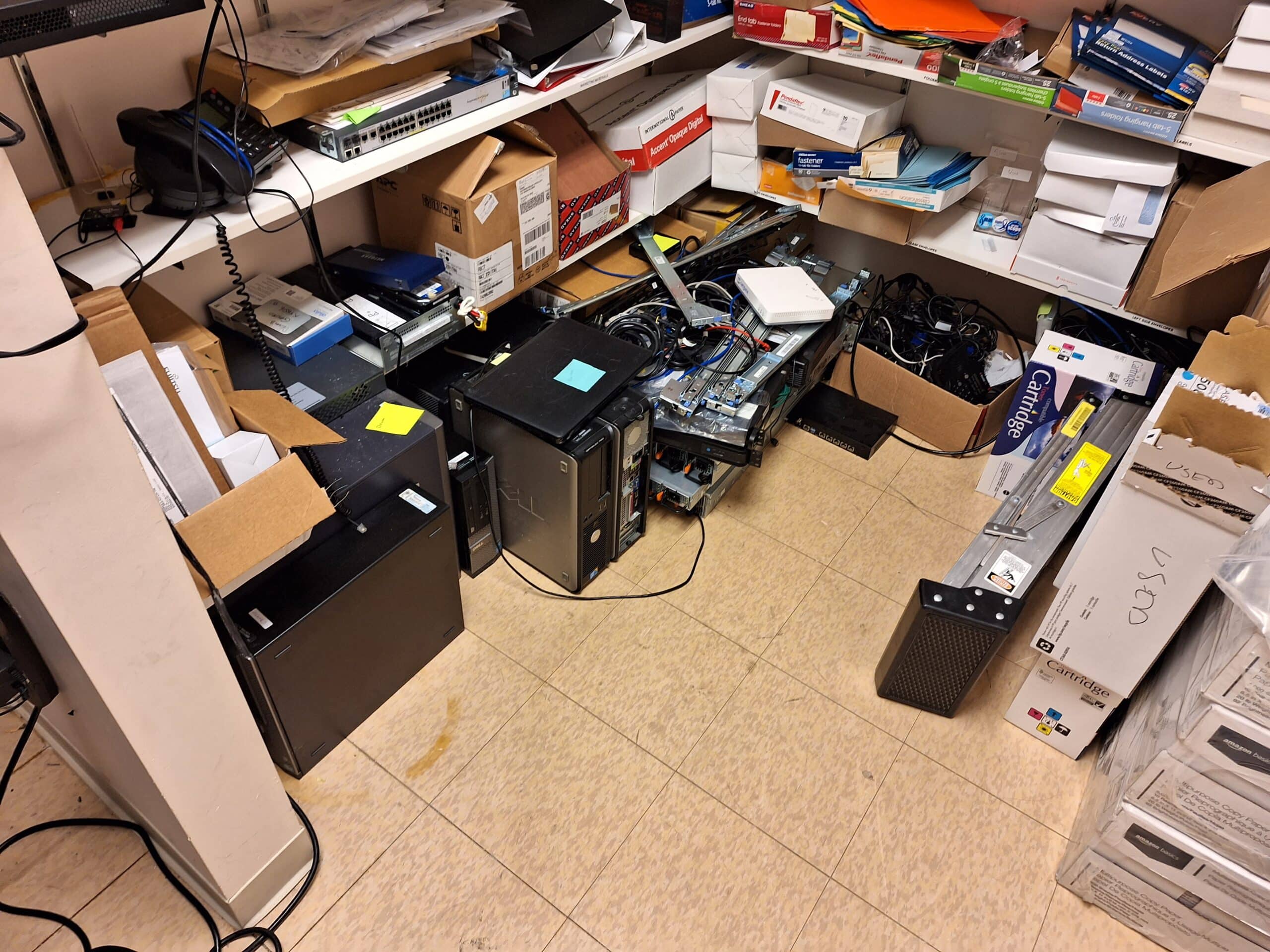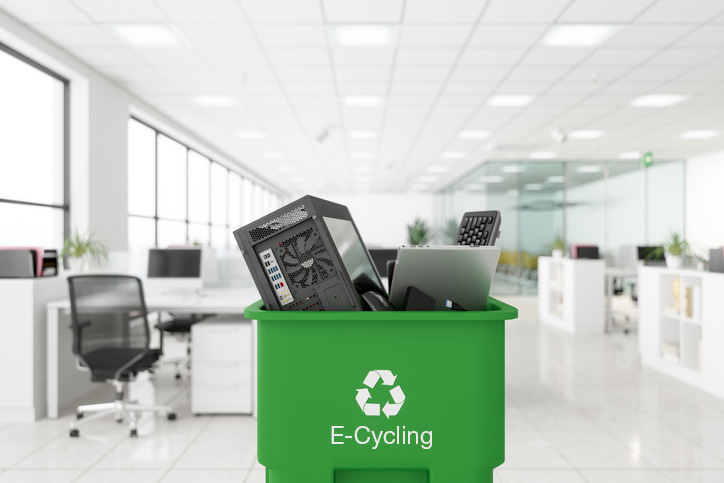Changing E-Waste: Computer Recycling Done Right
Changing E-Waste: Computer Recycling Done Right
Blog Article
Sustainable IT Solutions: Trustworthy Computer Recycling Provider
As modern technology proceeds to progress at a fast speed, the problem of electronic waste, or e-waste, has become a pushing problem for both individuals and companies alike. The inappropriate disposal of computers and other digital tools not just adds to ecological deterioration, however likewise postures substantial threats to human wellness. Taking into account this, the demand for trustworthy computer reusing services has never been more critical. In this conversation, we will certainly explore the ecological influence of e-waste, the advantages of accountable computer system recycling, just how to choose a trustworthy recycling service, the recycling process for computer systems and electronic devices, and the duty of government guidelines in e-waste monitoring. Join us as we uncover the sustainable IT remedies that can aid us navigate the complexities of digital waste in a trustworthy and accountable manner.
The Environmental Impact of E-Waste
The inappropriate disposal of digital waste, typically recognized as e-waste, has considerable environmental ramifications. E-waste describes discarded digital tools such as computer systems, televisions, and smart devices (computer recycling). These tools have dangerous products such as lead, mercury, cadmium, and brominated flame resistants, which can be hazardous to both human wellness and the setting if not effectively handled
When e-waste is incorrectly gotten rid of, it typically finishes up in garbage dumps or is blazed, launching poisonous substances into the water, soil, and air. The release of these dangerous products can contaminate groundwater, pollute the air, and add to soil deterioration, posing serious wellness threats to nearby communities and communities.
Additionally, the inappropriate disposal of e-waste additionally adds to the deficiency of natural deposits. computer recycling. Lots of digital devices include beneficial steels like gold, silver, and copper that can be recouped and recycled if appropriately reused. When e-waste is not recycled, these useful resources are lost, and the demand for brand-new raw materials rises, leading to increased mining activities and further environmental deterioration.
To mitigate the environmental impact of e-waste, appropriate recycling and disposal methods need to be used. This includes the responsible collection, taking down, and recycling of digital gadgets to recuperate valuable products and make certain the safe monitoring of harmful compounds. Carrying out efficient e-waste monitoring practices is critical to safeguard the atmosphere, preserve sources, and promote a lasting future.

Benefits of Liable Computer System Recycling
Effectively reusing computer systems provides a wide range of benefits, including ecological conservation and resource preservation. Accountable computer recycling not just helps avoid digital waste from finishing up in garbage dumps, however it additionally lowers the requirement for resources and energy in the manufacturing of new tools.
One of one of the most considerable advantages of responsible computer recycling is the preservation of the atmosphere. When electronic waste is poorly dealt with, it can launch dangerous substances such as lead, mercury, and cadmium into the soil and water, posturing a danger to communities and human wellness. By recycling computers, these hazardous materials can be safely drawn out and thrown away, reducing the threat of pollution.
Another benefit is resource conservation. Computer systems consist of beneficial products like gold, copper, silver, and aluminum, which can be recovered and reused via reusing processes. By extracting and reusing these products, the need for mining new sources is decreased, conserving natural sources and lowering the environmental impact of source removal.
Moreover, responsible computer system reusing aids to lower power usage. Manufacturing brand-new computers calls for a significant quantity of energy, from the removal of basic materials to the setting up procedure. By reusing computers and reusing their parts, the energy-intensive manufacturing process can be prevented, bring about a reduction in greenhouse gas discharges and a much more lasting use power resources.
Exactly How to Select a Trustworthy Computer System Recycling Service
When selecting a computer system recycling service, it is necessary to think about a couple of vital factors to ensure that you choose a trustworthy and reputable supplier. It is important to verify if the reusing service complies with appropriate ecological laws and practices. A credible company will certainly have accreditations and certifications that demonstrate their commitment to responsible recycling. Look for accreditations such as R2 (Accountable Recycling) or e-Stewards, which ensure that the recycling procedure fulfills strict requirements for environmental security and data safety. Check if the solution supplies safe and secure data devastation. Information safety and security is a critical worry when reusing computer systems, as sensitive details kept on old tools can be vulnerable to theft or abuse. A reliable recycling solution ought to have safe data devastation protocols link in position, such as information cleaning or physical devastation of storage devices. Furthermore, consider the service's track record and credibility. Search for reviews or testimonials from previous clients to assess their level of consumer satisfaction and reliability. Finally, think about the service's openness and liability. A credible carrier ought to have the ability to give thorough info about their recycling process, consisting of just how they handle unsafe materials and ensure correct disposal. By thinking about these factors, you can select a computer system recycling service that is moral, trusted, and environmentally responsible.
The Recycling Process for Computers and Electronic Devices
To make certain responsible disposal and reduce environmental impact, recognizing the recycling procedure for computer systems and digital gadgets is important when picking a trustworthy recycling service. The reusing process for these gadgets commonly entails numerous stages.
Firstly, the gadgets are collected from people, services, or drop-off Read Full Report factors. This collection procedure may entail transport logistics and safe managing to safeguard the sensitive data consisted of within the devices. When gathered, the devices are arranged based upon their kind, such as smartphones, laptops, or desktop computers.
After arranging, the tools go through a thorough information damage process to make sure that any type of individual or sensitive information is completely removed. This action is important to shield the personal privacy and security of individuals and companies. Information damage techniques may include cleaning, degaussing, or physical destruction of the storage media.
Next, the devices are disassembled into their private parts. This permits the separation of different products, such as plastics, steels, and motherboard. These materials are then sent out to specialized recycling facilities for additional processing.
The recycling centers use numerous strategies to remove valuable materials from the electronic waste. These materials can be reused or repurposed in the manufacturing of new items. The remaining waste is thrown away in an environmentally liable manner, adhering to regulative standards.
The Duty of Federal Government Regulations in E-Waste Management
Government guidelines play a critical role in the reliable management of e-waste. With the continual development of the electronic devices sector and the boosting worry for ecological sustainability, the requirement for appropriate disposal and recycling of digital waste has come to be extra apparent. Government laws assist to make certain that e-waste is managed in a sustainable and liable manner.
One of the key roles of government laws is to establish standards and standards for e-waste administration. These regulations specify the proper techniques for collection, transportation, and recycling of electronic waste. By developing these requirements, federal governments can make certain that e-waste is dealt with in such a way that minimizes its influence on the environment and human health.
Government regulations also play a crucial duty in applying the correct disposal of digital waste. They need merchants and manufacturers to take duty for the items they market and produce. This consists of implementing take-back programs, where manufacturers are accountable for gathering and recycling electronic waste from consumers. These regulations help to move the problem of e-waste administration from the private consumer to the sector, making certain that electronic waste is managed in a more lasting way.

Conclusion
Finally, it is vital to consider the ecological effect of e-waste and select a trustworthy computer system recycling service to properly dispose of electronic devices. By complying with federal government laws and taking part in correct reusing procedures, we can mitigate the adverse effects of e-waste on the environment and advertise a more lasting future.
In this discussion, we will discover the environmental effect of e-waste, the advantages of responsible computer system recycling, just how to choose a reliable recycling service, the reusing process for computers and electronic tools, and the duty of government laws in e-waste management. Computer systems include beneficial products like gold, light weight aluminum, silver, and copper, which can be recuperated and recycled via recycling procedures.Moreover, accountable computer recycling helps to reduce energy intake. Information safety is an essential concern when recycling computers, as delicate info stored on old gadgets can be susceptible to burglary or misuse. By considering these variables, you can pick a computer recycling solution that is moral, reliable, and ecologically liable.
Report this page